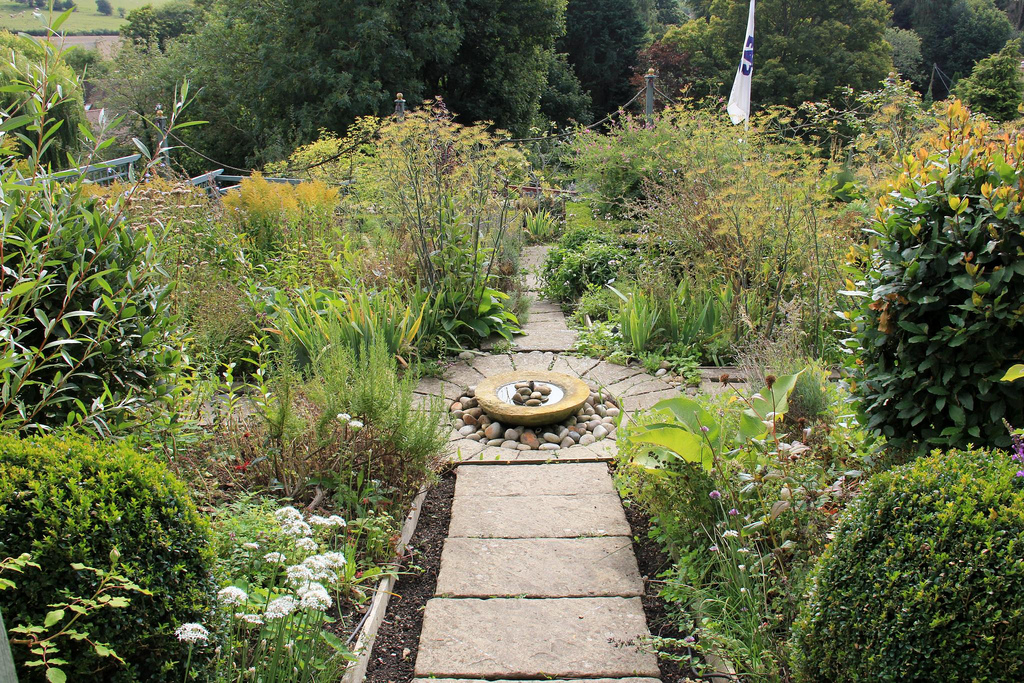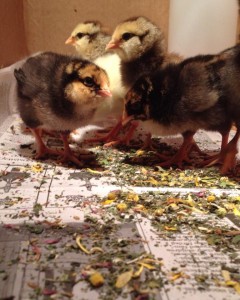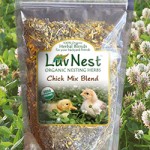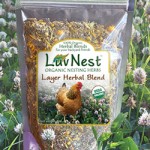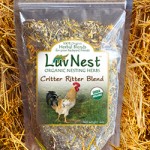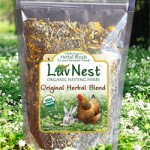Across all continents and cultures, man has been using herbs for their medicinal and beneficial properties for thousands of years. Even today it is estimated that 80% of the world’s population relies on herbal medicines as part of their primary health care. Traditional Chinese medicine and Ayurveda (Hindu medicine) continues to be based on the use of herbal therapies and remedies. The beneficial properties of herbs are not limited to humans.
Every backyard chicken owner can promote the health and happiness of their hens through the use of fresh and dried herbs. There are numerous herbs which can repel pests, promote vitality and improve the overall well-being with your birds. In a nutshell, you can use herbs as simple, aromatic and inexpensive tools for your flock. When given the opportunity, chickens will freely eat herbs to get the benefits from these plants and flowers.
Certified herbalist and backyard chicken keeper Tina Hickman joins me on the Urban Chicken Podcast this week to discuss the many ways herbs can be used to benefit your hens.
When it comes to raising chickens, herbs can be used for both their preventative and curative properties. Additionally herbs have aromatic and nutritional values. Herbs are generally used in two manners with a chicken flock: as aromatics for the coop and nesting box; or additives to be consumed as snacks or used as feed/water fortifiers.
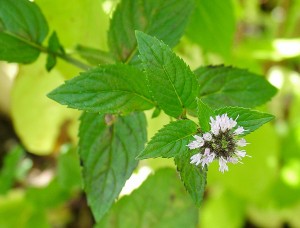 As a preventative, herbs are credited with repelling coop and flock pests such as lice, mites and fleas. Herbs such as tansy, fennel, mugwort, marigolds and wormwood are often grown surrounding a chicken coop and run as a general external parasite repellent. Other herbs such as oregano, bay leaves, peppermint, rosemary, catnip, feverfew, lavender, pennyroyal, eucalyptus leaves and garlic are all known to be effective insecticides. These various herbs can be grown, clipped and placed inside your coop and nesting boxes to help ward off the creepy-crawlies.
As a preventative, herbs are credited with repelling coop and flock pests such as lice, mites and fleas. Herbs such as tansy, fennel, mugwort, marigolds and wormwood are often grown surrounding a chicken coop and run as a general external parasite repellent. Other herbs such as oregano, bay leaves, peppermint, rosemary, catnip, feverfew, lavender, pennyroyal, eucalyptus leaves and garlic are all known to be effective insecticides. These various herbs can be grown, clipped and placed inside your coop and nesting boxes to help ward off the creepy-crawlies.
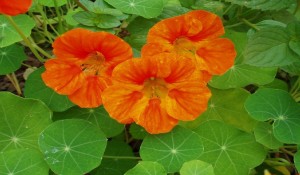 As a curative, oregano is believed to combat many common chicken illnesses such as salmonella, coccidia, avian flu and infectious bronchitis. Some herbs, such as nasturtium, wormwood, and garlic are used as natural wormers.
As a curative, oregano is believed to combat many common chicken illnesses such as salmonella, coccidia, avian flu and infectious bronchitis. Some herbs, such as nasturtium, wormwood, and garlic are used as natural wormers.
Several herbs have antibacterial and antifungal properties, which make them useful for a backyard flock. Basil, cilantro, lemon balm, nasturtium, calendula, thyme, oregano, meadowsweet and spearmint are just a few herbs with these properties.
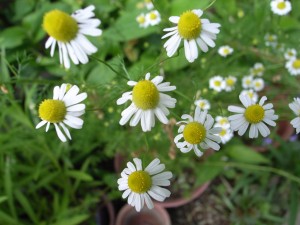 Aromatherapy is the practice of using herbs (or their essential oils) to help stimulate better mental states and improve overall well-being. The benefits derived from aromatherapy practice are not limited to humans – they apply to your chickens as well. Chamomile, lemon balm, lavender, and dill can be used to relieve stress and calm your flock. Fennel, red clover, marjoram, marigold, garlic, nasturtium, parsley, nettle are just a several herbs known to help stimulate egg-laying in hens.
Aromatherapy is the practice of using herbs (or their essential oils) to help stimulate better mental states and improve overall well-being. The benefits derived from aromatherapy practice are not limited to humans – they apply to your chickens as well. Chamomile, lemon balm, lavender, and dill can be used to relieve stress and calm your flock. Fennel, red clover, marjoram, marigold, garlic, nasturtium, parsley, nettle are just a several herbs known to help stimulate egg-laying in hens.
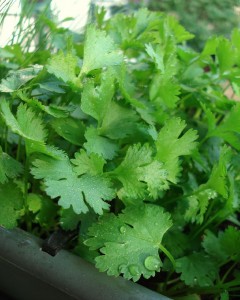 Some herbs are high in vitamins and nutrients and are simply good for your flock to eat. Cilantro is high in vitamins A and K. Rose petals are extremely high in vitamin C. Chamomile contains calcium that is bioavailable for your birds. Eggs with rich golden yolks are common in hens that eat comfrey. Comfrey is also packed with protein, B12, potassium, calcium and amino acids. Your chickens can also get several vitamins from eating catnip (vitamins A, B1, B2, B3, B5, B6, B9, B12 and C). Wowzers! Maybe I should be eating catnip too.
Some herbs are high in vitamins and nutrients and are simply good for your flock to eat. Cilantro is high in vitamins A and K. Rose petals are extremely high in vitamin C. Chamomile contains calcium that is bioavailable for your birds. Eggs with rich golden yolks are common in hens that eat comfrey. Comfrey is also packed with protein, B12, potassium, calcium and amino acids. Your chickens can also get several vitamins from eating catnip (vitamins A, B1, B2, B3, B5, B6, B9, B12 and C). Wowzers! Maybe I should be eating catnip too.
A serious caveat when considering whether to try herbal treatments and remedies on your own, not all herbs are innocuous. In fact, a few can be highly dangerous if misused. For example, though effective, wormwood and tansy can be 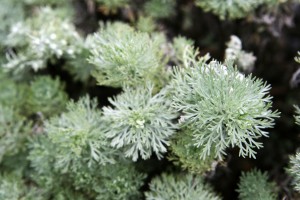 toxic and harmful if not properly taken with extreme caution. The use of wormwood over long, continuous periods of time can damage an animal’s kidneys, liver and nervous system. Tansy (which was traditionally used for treating threadworms, roundworms and tapeworms) is toxic if consumed in large quantities. There is an art to herbalism and a reason why people become certified as practitioners. This is warning is not given to discourage you from trying out homegrown herbs on your flock, but is meant to encourage discretion and proper self-education on the use of herbs.
toxic and harmful if not properly taken with extreme caution. The use of wormwood over long, continuous periods of time can damage an animal’s kidneys, liver and nervous system. Tansy (which was traditionally used for treating threadworms, roundworms and tapeworms) is toxic if consumed in large quantities. There is an art to herbalism and a reason why people become certified as practitioners. This is warning is not given to discourage you from trying out homegrown herbs on your flock, but is meant to encourage discretion and proper self-education on the use of herbs.
Today’s guest on the Urban Chicken Podcast, Tina Hickman, graduated from an intensive herbalist education program, where she earned her certification. Tina applied what she learned in her herbalist program to her own backyard flock. By using herbs commonly available and grown, she was able to treat her laying hens. Tina created her own special blend of herbs which she put in her nesting boxes. Her hens responded well to this natural treatment and began laying more frequently. In fact, one of Tina’s older hens, who is well past her egg-laying prime, started to regularly lay again as a result of these nesting box herbs. (Note: in the interview Tina mentions an older hen that started laying again with the use of nesting box herbs. To clarify, that older hen, Dinah, is 3 years old and now lays at least 3x a week.)
Tina took her specially created herbal blends for her own chickens and founded her business Luv Nest. There are four different dry herbal blends for the benefit of backyard flocks available from Luv Nest. These four blends are: Chick Mix Blend; Layer Blend; Critter Ritter Blend; and Original Blend. These various formulas of nesting box herbs provide your flock respectively with anti-parasitic, anti-microbial, calming, de-stressing, and overall health support. Moreover, every blend is made with 100% organic herbs that a safe to consume without negative side effects.
Tina shares on this episode of the Urban Chicken Podcast, which herbs you can grow safely and simply for use with your own backyard birds. She also shares her favorite herbs and why they are so helpful for your chickens. We also discuss her new business and Luv Nest products.
CHICKEN NEWS:
- Contest Giveaway – Win 2 bags of your choice of Luv-Nest Herb Blends LINK
MAIN SEGMENT:
- Luv Nest – Here is their website LINK
- Luv Nest Critter Ritter: Critter Ritter
- Luv Nest Layers Blend: Layer Blend
- Luv Nest Chicks Mix: Chick Mix
- Luv Nest Original Blend: Original Herb Blend
- Facebook – Luv Nest’s Facebook Page LINK
- Natural Chicken Keeping: Benefits of Herbs in Nesting Boxes ARTICLE
- Fresh Eggs Daily – Nesting Box Herbs: Chicken Aromatherapy ARTICLE
- Chicken-Chick – Herbs for Coop Pest Control ARTICLE
- Herbarium – Herbal Remedies for Chicken Health ARTICLE
- Herb Cottage – Herbs for Healthy Chickens ARTICLE
- Tina Hickman’s website for her work as illustrator LINK
- Misty Meadows Herbal Center in New Hampshire LINK
- Fiasco Farm – Wormwood as Chicken Wormer Pros/Cons ARTICLE
SALLY’S SIDENOTES:
- Winner of “Eat the Yolks” book by Liz Wolfe was UCP Listener Kevin L.
- Support the Urban Chicken Podcast by shopping Amazon starting here: Amazon
- If Amazon is not your thing – you could also support the show HERE
Podcast: Play in new window | Download | Embed
Subscribe: Apple Podcasts | RSS

